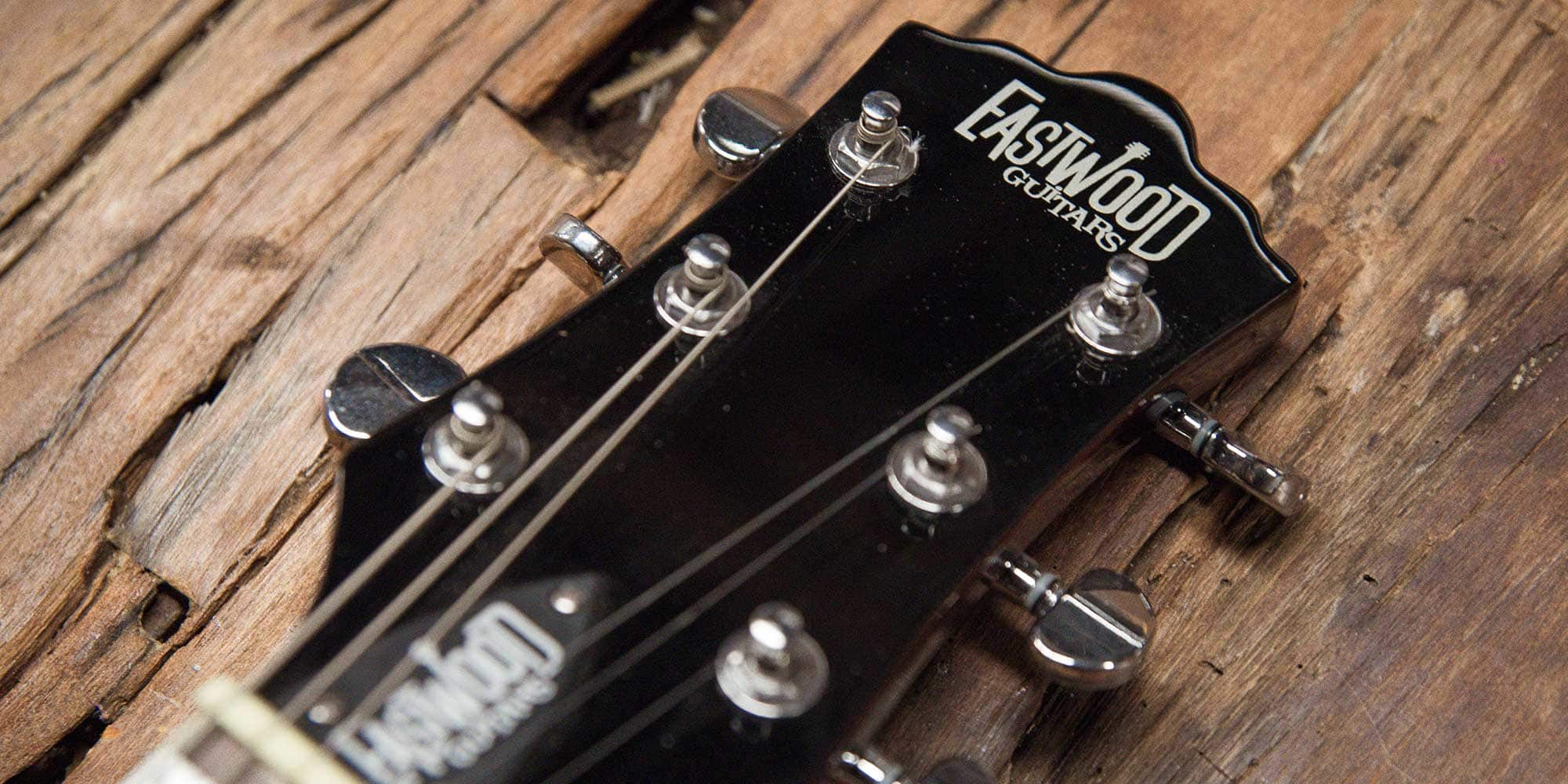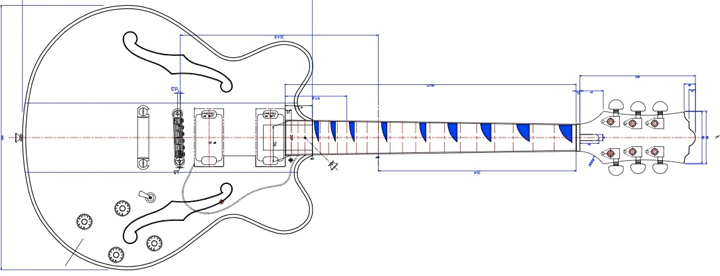
There’s a certain irony to the fact that a company that made its bones recreating the weird, cheap imported guitars of yesteryear now is on the forefront of guitar marketing and manufacturing. But for Mike Robinson, president of Eastwood Guitars, the mission has been the same since 1997 when the company was founded: put the customer first.
Since then, Eastwood has gone from distributing guitars from manufacturers including Burns, DiPinto and Eko, to building and selling Eastwood and Airline guitars through retailers and online distributors, as well as direct-to-consumer.
Now the company is offering small batch guitars through a Kickstarter-like program, Eastwood Custom Shop, and accelerating its use of social media to recruit and develop lifelong repeat customers.
A New Business Model for Guitar Builders
Like many musical instrument companies, Eastwood uses contract builders overseas to build his creations for a fraction of what it would cost to build them in the United States, benefiting from the economies of scale afforded to large manufacturers.
Tooling, training and hours of labor are a sunk cost for the factory, which benefits most when production lines are active and orders are predictable. For Eastwood, the many benefits include lower costs associated with outsourcing. In turn, customers get a less expensive, higher quality product backed by a name brand.
In my mind, to be selling only through dealers is a cryptic, old model. That makes no sense to me whatsoever and never has. Maybe back in the ‘70s and the ‘80s that was really the only way to do it."
The business really started with the Internet, Robinson says, which enabled Eastwood to create a massive email list of subscribers to market to directly. The advent of social media, inexpensive e-commerce platforms and now the rise of crowdsourcing has further propelled growth.
“In my mind, to be selling only through dealers is a cryptic old model. That makes no sense to me whatsoever and never has. Maybe back in the ‘70s and the ‘80s that was really the only way to do it.”
Eastwood’s business model is similar to Apple’s, Robinson says, which offers retail sales through Apple Stores, authorized dealers and online, with delivery direct from the factory overseas.
“It's all about making the customer first and putting a system in place that allows them to make those decisions,” Robinson says.

Drawing for Eastwood's Classic 6 HB
For customers, Eastwood guitars sell for the same price through all channels, with the value-added opportunity to walk into a retailer, pick up an Eastwood guitar and try it.
“We're just trying to create an environment where the end user is the customer, however that customer wants to buy.”
This multichannel approach also enables Eastwood to overcome a challenge that all manufacturers are trying to address: limited retail shelf space. “If you add up all of our models and colors, we've got over 200 SKUs. Realistically, any guitar shop probably only has 12 or 15 guitars of ours in stock at any given point in time. The old distribution model doesn't work anymore.”
Crowdsourced Guitars
Eastwood now has taken its fulfillment model a step further by offering small-batch guitars through a Kickstarter-type program in which a design is proposed and orders are taken with deposits before items are built and delivered. It’s an idea that has appealed to the company for years, Robinson says, but Kickstarter didn’t play to Eastwood’s strength: direct, active relationships with customers.
“We kept looking at Kickstarter and thought, well, they won't have it on a mailing list,” Robinson says. The site doesn’t cater to guitar players specifically, as does MyRareGuitars.com, for example.
“Our mailing list is geared directly toward guitar buyers who like what we specialize in. So why do we need Kickstarter? We decided to build our own Kickstarter and market it to our own customers. Then, as Eastwood Custom Shop grows, we don't need to continue doing weird old vintage stuff with too many knobs and switches. There is a lot of other stuff out there that was cool, vintage and long gone that we know we can make. But we need to broaden the audience.”
Since launching Eastwood Customs, the company has offered more than 16 small-batch designs, with none of the uncertainty and start-up cost associated with the launch of a new product line.
One recent offering is the Eastwood RD Artist, which is essentially a reproduction of the old Gibson RD Artist.
“Gibson has taken a crack at it a few times, and it was overpriced,” Robinson says. “Our wheelhouse is kind of in that $700 range. So we put up images and said, ‘We are going to make this. The final street price is going to be $699. If you want one, we need $150 deposit.’ Then we go to our factory and put in a production order. Months later, the guitars arrive in our Chicago warehouse. The customer pays the balance and they've got their guitar.”

The Eastwood Custom Shop Process
Leveraging Social Media and Direct Marketing For Guitar Sales
“With social media these days, I don't need to spend any marketing money taking out a full-page ad saying that I'm doing this,” Robinson says. “We're trying to build a following of people who see something they like, and they put their money down.”
A case in point is the La Baye 2×4, a vintage guitar popularized by Bob 1 of Devo.
The secret sauce of this whole custom shop thing is the fact that, if you can latch on to a particular fan base, then social media just spreads the word.”
“I thought it would never sell,” Robinson laughs. “I thought maybe we'd sell a dozen of them. But because Devo has a fan base of 385,000 people on Facebook, we sold 230 of them. The secret sauce of this whole custom shop thing is the fact that, if you can latch on to a particular fan base, then social media just spreads the word.”
So far the Eastwood Custom Shop has completed and shipped more than 50 projects and has another two dozen in production or available for buyers to place a deposit on. They are now launching a new project every week, and by the end of 2016, Robinson says the company will have done over 80 successful launches of 80 different models.
“Fender would look at this and say, ‘Why make only 24 of something?’ But for our customer base, and the people who like what we do, that's a reasonable number. The real gem about this is that all we've done is flip around the business model. In the old days - and the way most companies still do it - execs would come up with an idea, take it to production, build hundreds of guitars. Then push them through their dealer channel and hope that somebody is going to buy it. This way, I don't even make it if I don't get enough interest.”
Shortening the Guitar Supply Chain
Another big advantage under this business model is a much shorter supply chain, which accelerates speed to market while reducing uncertainty and costs, all of which contribute to overall profitability.
“By the time any given project hits our Chicago warehouse, a week later everybody's got them in their hands. They've already gone back to the Eastwood website and written reviews on them,” Robinson says. This supports brand awareness.
“If I sold just to the dealer and the dealer sold to the end user, I'd have no idea how to get ahold of the end user to solicit a review.”
By the time any given project hits our Chicago warehouse, a week later everybody's got them in their hands. They've already gone back to the Eastwood website and written reviews on them."
In addition to offering a way to market the guitars, Robinson says Facebook and other social media platforms offer him a way to gauge the company’s success relative to competitors.
“I always keep an eye on people's Facebook pages. I look at how many likes Eastwood Guitars has vs. Reverend vs. Fender. It gives me kind of a sense of customer awareness out there as a percentage of the whole market of guitars.”
Sharing Direct-To-Consumer Factories
Eastwood’s most recent effort is to offer manufacturing services to other independent builders that are looking to expand sales, production and brand awareness. The first to sign up was Jeff Senn Guitars out of Nashville.
“This guy is a respected U.S. builder who makes guitars in the $3,000 price range,” Robinson says. “You’re likely going to sell 10 or 20 guitars per year at that rate if you are a boutique builder. We made arrangements for him to use our facilities to manufacture his guitars and sell some of them for under $700,” Robinson says.
“We could be a service to any boutique builder if they are interested in expanding outside of one-off hand-built guitars, which is hard to do at that price point. With a model like this, you could sell 50 or 100 per month. It’s like a co-branding arrangement. We think it could be a new model that the custom shop brings along.”
Eastwood

